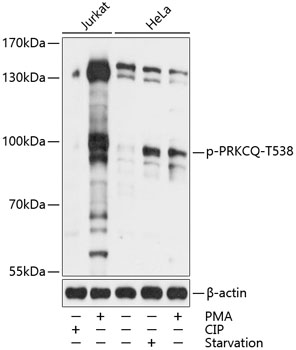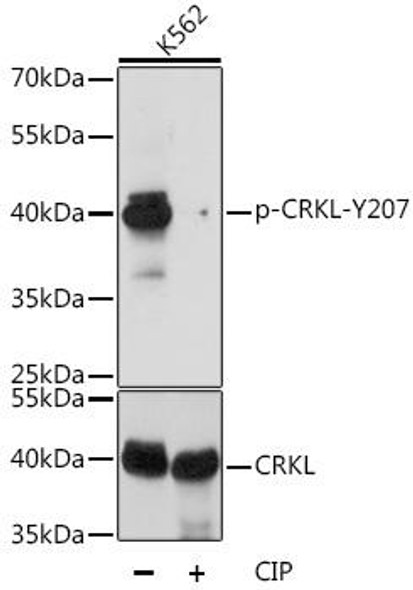Immunology Antibodies 3
Anti-Phospho-PRKCQ-T538 pAb Antibody (CABP0798)
- SKU:
- CABP0798
- Product Type:
- Antibody
- Applications:
- WB
- Reactivity:
- Human
- Host Species:
- Rabbit
- Isotype:
- IgG
- Research Area:
- Immunology
Description
| Antibody Name: | Anti-Phospho-PRKCQ-T538 Antibody |
| Antibody SKU: | CABP0798 |
| Antibody Size: | 20uL, 50uL, 100uL |
| Application: | WB |
| Reactivity: | Human |
| Host Species: | Rabbit |
| Immunogen: | A synthetic phosphorylated peptide around T538 of human PRKCQ (NP_006248.1). |
| Application: | WB |
| Recommended Dilution: | WB 1:500 - 1:2000 |
| Reactivity: | Human |
| Positive Samples: | Jurkat, HeLa |
| Immunogen: | A synthetic phosphorylated peptide around T538 of human PRKCQ (NP_006248.1). |
| Purification Method: | Affinity purification |
| Storage Buffer: | Store at -20°C. Avoid freeze / thaw cycles. Buffer: PBS with 0.02% sodium azide, 50% glycerol, pH7.3. |
| Isotype: | IgG |
| Sequence: | TNTF C |
| Gene ID: | 5588 |
| Uniprot: | Q04759 |
| Cellular Location: | Cell membrane, Cytoplasm, Peripheral membrane protein |
| Calculated MW: | 67kDa/74kDa/81kDa |
| Observed MW: | 98kDa |
| Synonyms: | PRKCQ, PRKCT, nPKC-theta |
| Background: | Protein kinase C (PKC) is a family of serine- and threonine-specific protein kinases that can be activated by calcium and the second messenger diacylglycerol. PKC family members phosphorylate a wide variety of protein targets and are known to be involved in diverse cellular signaling pathways. PKC family members also serve as major receptors for phorbol esters, a class of tumor promoters. Each member of the PKC family has a specific expression profile and is believed to play a distinct role. The protein encoded by this gene is one of the PKC family members. It is a calcium-independent and phospholipid-dependent protein kinase. This kinase is important for T-cell activation. It is required for the activation of the transcription factors NF-kappaB and AP-1, and may link the T cell receptor (TCR) signaling complex to the activation of the transcription factors. |
| UniProt Protein Function: | PKCT: an AGC kinase of the PKC family. A novel PKC: Ca2+ independent but still regulated by PS, DAG and phorbol esters. Contains 2 zinc-dependent phorbol-ester and DAG binding domains. Expressed in skeletal muscle and hematopoietic cells. May play a role in T cell receptor signaling and insulin resistance. Required for TCR-induced NF-kappaB activation in mature T lymphocytes. |
| UniProt Protein Details: | Protein type:Kinase, protein; EC 2.7.11.13; Protein kinase, Ser/Thr (non-receptor); Protein kinase, AGC; AGC group; PKC family; Delta subfamily Chromosomal Location of Human Ortholog: 10p15 Cellular Component: plasma membrane; immunological synapse; cytosol Molecular Function:protein serine/threonine kinase activity; protein binding; protein kinase C activity; metal ion binding; ubiquitin-protein ligase activity; ATP binding Biological Process: positive regulation of interleukin-17 production; axon guidance; phototransduction, visible light; platelet activation; apoptosis; positive regulation of interleukin-2 biosynthetic process; membrane protein ectodomain proteolysis; negative regulation of insulin receptor signaling pathway; protein ubiquitination; protein amino acid phosphorylation; T cell receptor signaling pathway; activation of NF-kappaB transcription factor; rhodopsin mediated signaling; positive regulation of interleukin-4 production; regulation of rhodopsin mediated signaling; regulation of transcription, DNA-dependent; innate immune response; positive regulation of T cell proliferation; regulation of cell growth; positive regulation of T cell activation; inflammatory response; blood coagulation; cell structure disassembly during apoptosis |
| NCBI Summary: | Protein kinase C (PKC) is a family of serine- and threonine-specific protein kinases that can be activated by calcium and the second messenger diacylglycerol. PKC family members phosphorylate a wide variety of protein targets and are known to be involved in diverse cellular signaling pathways. PKC family members also serve as major receptors for phorbol esters, a class of tumor promoters. Each member of the PKC family has a specific expression profile and is believed to play a distinct role. The protein encoded by this gene is one of the PKC family members. It is a calcium-independent and phospholipid-dependent protein kinase. This kinase is important for T-cell activation. It is required for the activation of the transcription factors NF-kappaB and AP-1, and may link the T cell receptor (TCR) signaling complex to the activation of the transcription factors. [provided by RefSeq, Jul 2008] |
| UniProt Code: | Q04759 |
| NCBI GenInfo Identifier: | 334848126 |
| NCBI Gene ID: | 5588 |
| NCBI Accession: | NP_001229342.1 |
| UniProt Secondary Accession: | Q04759,Q14DH6, Q3MJF1, Q64FY5, Q9H508, Q9H549, |
| UniProt Related Accession: | Q04759 |
| Molecular Weight: | 81,865 Da |
| NCBI Full Name: | protein kinase C theta type isoform 2 |
| NCBI Synonym Full Names: | protein kinase C, theta |
| NCBI Official Symbol: | PRKCQ |
| NCBI Official Synonym Symbols: | PRKCT; nPKC-theta |
| NCBI Protein Information: | protein kinase C theta type |
| UniProt Protein Name: | Protein kinase C theta type |
| UniProt Synonym Protein Names: | nPKC-theta |
| UniProt Gene Name: | PRKCQ |
| UniProt Entry Name: | KPCT_HUMAN |







